| Srl | Item |
| 1 |
ID:
189261
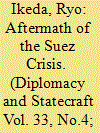

|
|
|
|
|
| Summary/Abstract |
There have been a great number of works on the Suez Crisis, but scarce academic attention has been paid to the process whereby its settlement was achieved. This paper argues that Britain succeeded in securing fairly sufficient Egyptian concessions with support from the US and the UN. The Americans, who had been hostile to the British prior to their agreement to withdraw troops from the Canal Zone, led the effort to make the Egyptians concede during negotiations on the Canal’s reopening. Contrary to the prevailing argument that Britain suffered a political defeat because of international pressure, this paper argues that Britain persuaded the US to acquiesce to the de facto arrangement because of the Canal’s economic value. The deployment of the UNEF brought a certain level of humiliation to Egyptian sovereignty. As Nasser’s influence in Middle Eastern affairs was contained, Britain chose a pragmatic deal with Egypt over the Canal.
|
|
|
|
|
|
|
|
|
|
|
|
|
|
|
|
| 2 |
ID:
121221
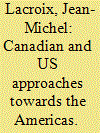

|
|
|
|
|
| Publication |
2012.
|
| Summary/Abstract |
The purpose of this article1
is to envisage the evolution of the relations
between Canada and the United States with their southern neighbours,
with the objective of comparing the respective attitudes of the two North
American partners vis-à-vis Latin America. Under the administration
of George W. Bush, anti-Americanism intensi?ed worldwide. Nothing
comparable occurred in the case of Canada: as a middle power with a legacy
of peacekeeping initiatives in its recent past, it naturally came to be perceived
in a more positive way. This difference led many to wonder whether Canada
might be contemplated, in the Americas as elsewhere, as representing
somehow a "more acceptable" version of the US. Or at least it did so until
the past few years, during which time it has been said that the elections of
Stephen Harper in 2006 and of Barack Obama in 2008 have brought about
a shift in the two countries' "images." This article seeks to test this claim,
with special reference to the relations of each with Latin America.
|
|
|
|
|
|
|
|
|
|
|
|
|
|
|
|
| 3 |
ID:
192886
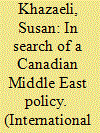

|
|
|
|
|
| Summary/Abstract |
Public debate about Canada's role in the Middle East is divided between two camps. One camp contends that Canadian foreign policy should return to its Pearsonian roots, in which Canada plays the role of a dispassionate but honest broker. The other holds that Canada's foreign policy should be defined by high-minded principles. The disagreement is over norms, not interests. This paper refers to two former Prime Ministers who roughly embody the two schools of thought on Canada's foreign and defense policy in the Middle East: Lester B. Pearson and Stephen Harper. Contrary to conventional wisdom that Harper was a realist and Pearson, a Pearsonian, the paper demonstrates that Pearson pursued a realist foreign policy that advances Canada's national security interests whereas Harper was guided by a values-based neo-conservative ideology.
|
|
|
|
|
|
|
|
|
|
|
|
|
|
|
|
| 4 |
ID:
163316
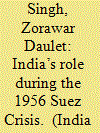

|
|
|
|
|
| Summary/Abstract |
The 1956 Suez conflict was not inevitable. The involvement of an impartial third party had offered an exit ramp for the main protagonists. Largely forgotten today, India strove to reconcile the interests of the Westerns powers with Arab nationalism. Displaying creativity and perseverance in attempting to arrest the sudden deterioration in security in its extended neighborhood, India’s unceasing but responsible support for a weaker Arab state in the backdrop of determined Western coercion is a useful illustration for contemporary policymakers who are attempting to craft a sustainable approach towards a tumultuous West Asia. Using previously unused archival documents, this paper adds to the small literature on India’s involvement in this crisis by offering the first detailed account of India’s attempt to prevent the outbreak of hostilities in those fateful months of 1956. By doing so, this article also reveals interesting facets of India’s approach to conflict management and regional stability in the 1950s, a role that was predicated on not just promoting strategic restraint between antagonistic states but also enabling conflict resolution options that preserved the vital interests of competing actors.
|
|
|
|
|
|
|
|
|
|
|
|
|
|
|
|
| 5 |
ID:
025441
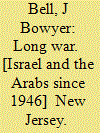

|
|
|
|
|
| Publication |
New Jersey, Prentice-Hall, 1961.
|
| Description |
ix, 467p.hbk
|
|
|
|
|
|
|
|
|
|
|
|
Copies: C:1/I:0,R:0,Q:0
Circulation
| Accession# | Call# | Current Location | Status | Policy | Location |
| 002759 | 956.04/BEL 002759 | Main | On Shelf | General | |
|
|
|
|
| 6 |
ID:
112823
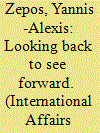

|
|
|
|
|
| Publication |
2012.
|
| Summary/Abstract |
ONE ASPECT OF INTERNATIONAL POLITICS that seems fraught with dialectical tensions at every turn is the effort to give form and substance to the apparent belief of NATO member states that in the face of issues of a global nature the Alliance has a distinctly functional nature in a dense transatlantic institutional environment. To the extent that in the beginning of the 21st century the likelihood of conventional war between major powers is lower than at any time in modern history, NATO's existential basis was severely challenged.
|
|
|
|
|
|
|
|
|
|
|
|
|
|
|
|
| 7 |
ID:
122220
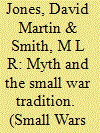

|
|
|
|
|
| Publication |
2013.
|
| Summary/Abstract |
In recent years a number of commentators have posited that the British reputation for conducting small wars has suffered in the wake of setbacks in Iraq and Afghanistan. The argument here contests whether such a tradition can be truly said to have ever existed. A close examination of this supposed tradition reveals it to be a myth. In fact, rarely have the British armed forces claimed a facility for counter-insurgency or small war. Invariably, commentators outside the Army have ascribed the tradition to them. Most notably, commentators in the United States keen to discern practices of minimum force or rapid institutional learning generated the narrative of British COIN expertise. Ultimately, what this myth reveals is that, when deconstructed, it is political will, not an ingrained understanding of fighting insurgencies, that has determined Britain's success, or otherwise, in so-called small wars.
|
|
|
|
|
|
|
|
|
|
|
|
|
|
|
|
| 8 |
ID:
130471
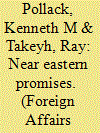

|
|
|
|
|
| Publication |
2014.
|
| Summary/Abstract |
Contrary to popular myths and conspiracy theories about Washington's desire to control the Middle East, for the past six decades, U.S. policymakers have usually sought to minimize the United States' involvement there. But the high-stakes nature of American interests in the region -- particularly oil -- and the complexity of the Middle East's problems always seem to draw the United States back in. In spite of himself, U.S. President Dwight Eisenhower was sucked into the Suez crisis in 1956 and the pan-Arabist revolts of the late 1950s. Lyndon Johnson barely lifted a finger to prevent the Six-Day War in 1967. Richard Nixon found himself grudgingly drawn into the region by the 1973 Arab-Israeli war and the superpower nuclear crisis it caused. Despite his aggressive image, Ronald Reagan did little in response to repeated attacks in Lebanon and the Persian Gulf by Iran and its proxies. George H. W. Bush came to office hoping to ignore Saddam Hussein, not to go to war with him. And although it is rarely remembered today, George W. Bush was not particularly interested in the Middle East and paid little attention to the region prior to the 9/11 attacks.
|
|
|
|
|
|
|
|
|
|
|
|
|
|
|
|
| 9 |
ID:
079233
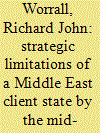

|
|
|
|
|
| Publication |
2007.
|
| Summary/Abstract |
This article looks at how Libya - a British client state under the Anglo-Libyan treaty - refused to allow Britain the use of forces and bases in that country for operations against Egypt during the summer and autumn of 1956. The subsequent restrictions over the use of Libya was shown over the movement of the 10th Armoured Division for 'training exercises' on the Cyrenaican-Egyptian border during early August and later manifested in a written request that the bases would not be used in connection with the operations in Egypt. What emerges is that the decision of the British government to acquiesce to this Libyan demand on 1 November 1956 was taken against the prospect of a 'second front' being opened up in Libya in which urban fighting there would take place there alongside the main operation against Egypt.
|
|
|
|
|
|
|
|
|
|
|
|
|
|
|
|
| 10 |
ID:
072101
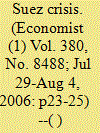

|
|
|
| 11 |
ID:
121516
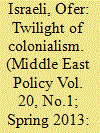

|
|
|
| 12 |
ID:
121162
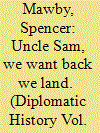

|
|
|
|
|
| Publication |
2012.
|
| Summary/Abstract |
The American acquisition of military and naval facilities at Chaguaramas in Trinidad during World War II led to a significant Anglo-American controversy during the late 1950s. In 1957 the Chief Minister of Trinidad, Eric Williams, began a campaign to eject the Americans from the base. Members of the Eisenhower administration regarded the campaign as evidence of anti-Americanism and the US Navy sought to undermine Williams by cooperating with his opponents. This interference was resented by British policy-makers who were planning to grant independence to Trinidad as part of a West Indian federation. The resulting Anglo-American disagreement continued until a compromise, which allowed the United States to retain the base in return for economic aid, was reached in 1961. The episode is significant in demonstrating that Washington was concerned about incipient anti-Americanism within the Anglophone Caribbean and in signifying British determination to defend their remaining colonial interests after the Suez crisis.
|
|
|
|
|
|
|
|
|
|
|
|
|
|
|
|